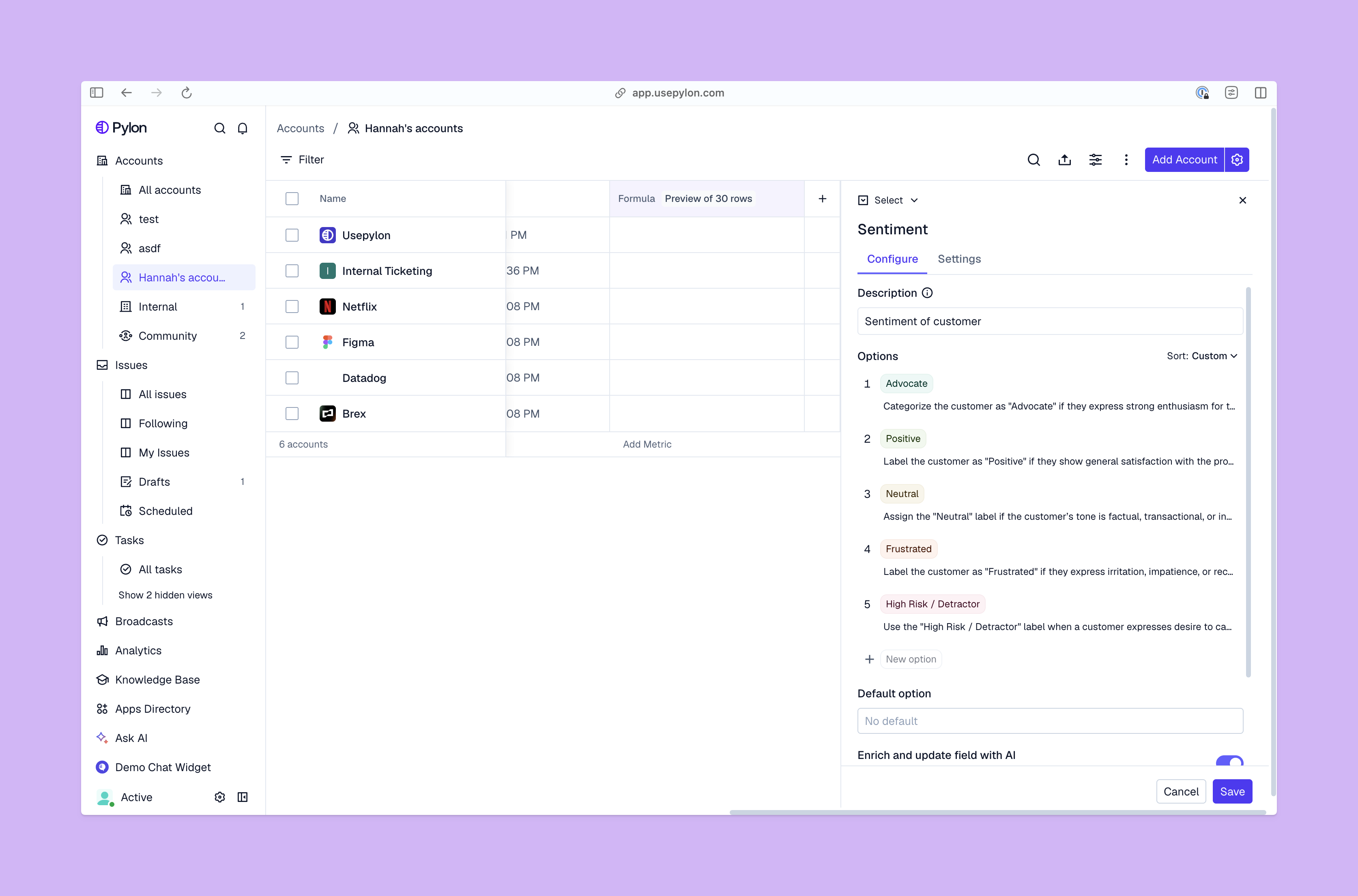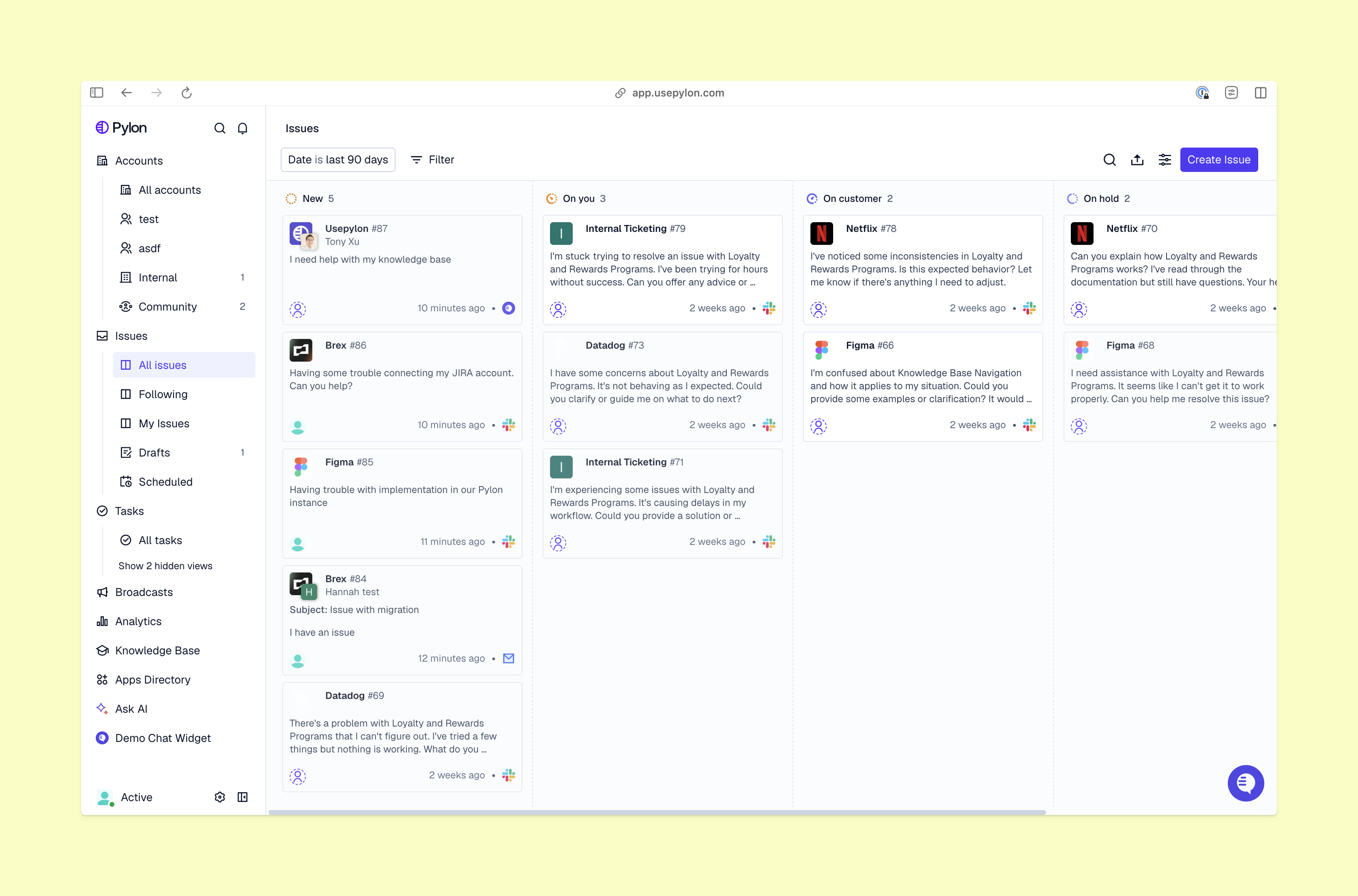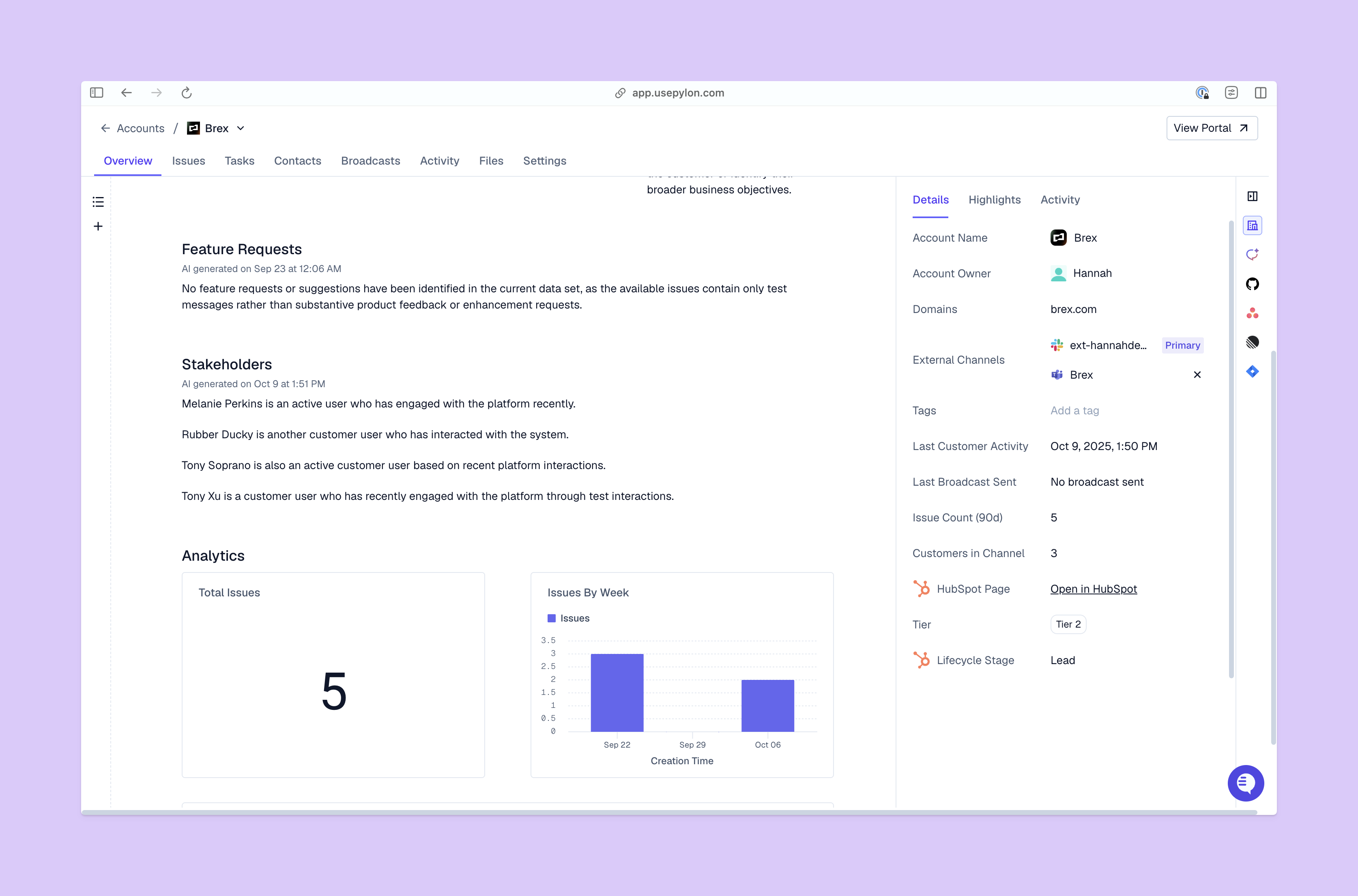What to Look for in a B2B Customer Support Platform for 2026
The best B2B customer support platforms for 2026 meet customers in Slack, Teams, and Discord while providing unified account views, intelligent automation, and real-time collaboration. Research shows modern platforms deliver 315% ROI with sub-6-month payback periods when chosen correctly. Learn which features matter most and how to evaluate platforms for your specific B2B needs.
Updated November 3, 2025 | 18 min read
As you evaluate B2B customer support software for 2026, it can be tricky to understand the differences between dozens of similar platforms and features.
Here’s our researched guide on the best support platforms right now and which key features to look out for.
TL;DR
The best B2B customer support platforms combine:
- native integrations with channels like Slack, Teams, and Discord
- account-centric support
- AI automation
- omnichannel capabilities
Modern platforms like Pylon deliver 30-50% faster response times and up to 40% lower costs compared to legacy tools.
Key features include smart ticketing, proactive communication, developer-friendly APIs, and unified customer context across all channels.
The Evolution of B2B Support Software

B2B customer support has transformed dramatically. Traditional email-based helpdesks are no longer sufficient for managing complex business relationships in 2026. Unlike B2C support, which focuses on high-volume individual transactions, B2B customer support requires handling multi-stakeholder accounts, long-term partnerships, and technical escalations across the communication channels your customers actually use.
According to McKinsey's 2024 B2B Pulse research, B2B customers now use an average of 10+ touchpoints across their buying journey. This means your support platform must meet customers where they work—whether that's Slack, Microsoft Teams, Discord, email, or in-app chat.
The stakes are high. Bain & Company research shows that increasing customer retention rates by just 5% can boost profits by 25-95%. With 91% of organizations now tracking service-driven revenue (up from 51% in 2018, according to Salesforce), your choice of a support platform directly impacts your bottom line.
Why Traditional Helpdesks Fall Short for B2B Companies
Legacy customer support tools were built for a different era, where email was the primary support channel and simple ticket tracking was enough. These systems struggle with the complexity of modern B2B relationships:
The channel gap. Most traditional helpdesks treat business messaging as an afterthought, offering only basic notifications rather than native support experiences in Slack or Microsoft Teams.
The account problem. Legacy tools organize support around individual tickets and users, not accounts. This makes it nearly impossible to get a unified view of complex B2B relationships with multiple stakeholders.
The AI deficit. While traditional platforms have bolted-on AI features, many lack the operational intelligence to automatically route tickets, update statuses, and proactively communicate with customers.
The integration challenge. Enterprise B2B companies need seamless connections with CRM systems, development tools, and business intelligence platforms—integrations that often require significant technical resources when you use a legacy system.
As businesses increasingly adopt omnichannel support strategies, the limitations of traditional helpdesks are becoming critical bottlenecks.
Essential Features of Modern B2B Support Platforms
1. Native Business Messaging Integration
The most critical feature for any B2B support platform in 2026 is native integration with the communication tools your customers use daily.
Why it matters: Your customers live in Slack, Teams, and Discord. Forcing them to switch to email or a support portal creates friction and slows resolution times. Native integrations mean customers can raise, track, and resolve issues without leaving their workspace.
What to look for:
- Two-way communication in Slack Connect channels
- Full Microsoft Teams helpdesk capabilities
- Discord support for developer communities
- Ability to manage all channels from a unified support interface
Platforms like Pylon were purpose-built to integrate with channels like Slack or Teams, not as email-first tools with messaging integrations added later. This architectural difference can result in 30-50% faster response times, according to industry benchmarks.
Learn more about implementing Slack as a ticketing system and setting up customer support on Discord.
2. Account-Centric Support Model
B2B support isn't about individual users, it's about managing relationships with entire organizations.
Why it matters: A single B2B customer account typically includes multiple stakeholders: end users, administrators, decision-makers, and technical contacts. An account-centric model ties every ticket, conversation, and SLA back to the customer account, providing support, success, and other post-sales teams with a shared customer 360.
What to look for:
- Account hierarchies and multi-contact management
- Account health scoring and churn risk indicators
- Consolidated view of all touchpoints across an account
- Ability to prioritize based on account value and renewal dates
- Cross-team visibility for support, customer success, and other post-sales teams
This approach directly addresses one of the core challenges of scaling B2B customer support effectively.
3. AI-Powered Automation and Intelligence
AI is now a baseline requirement for competitive B2B support operations.
Why it matters: According to HubSpot's 2024 State of Service Report, 92% of CRM leaders report AI has improved response times and 77% believe AI will handle most tickets by 2025. The right AI capabilities can dramatically reduce manual work while improving response quality.
What to look for:
- Automatic ticket triage and intelligent routing
- AI-powered response drafting based on knowledge base content
- Conversation summarization for quick context
- Sentiment analysis and urgency detection
- Proactive issue detection across channels
- Automated status updates and field completion
The best AI-powered customer support platforms use machine learning to understand account context, customer history, and product specifics to provide relevant suggestions and automated workflows.
Importantly, AI should add to your support team instead of replacing them. Complex B2B issues still require human expertise, judgment, and relationship management.
4. Omnichannel Support Capabilities
Modern B2B customers expect consistent experiences across every channel they use to interact with your business.
Why it matters: Gartner research shows that support interactions cost $8 on average while self-service costs only $0.10 per interaction. A true omnichannel approach allows customers to get help in their preferred channel while giving your team unified context across all channels.
What to look for:
- Unified inbox consolidating email, chat, messaging, and voice
- Seamless conversation threading across channels
- Context preservation when customers switch channels
- Consistent SLA tracking regardless of channel
- Self-service options through knowledge base software
Pylon specializes in omnichannel support for B2B, making sure no message falls through the cracks regardless of where customers reach out.
5. Developer-Friendly APIs and Integrations
Technical B2B companies need platforms that can deeply integrate with their existing tech stack and be customized for unique workflows.
Why it matters: Every B2B company has specific processes, tools, and data models. A platform with robust APIs allows you to build the exact support experience your business requires rather than forcing you into a one-size-fits-all approach.
What to look for:
- Webhook support for real-time updates
- Pre-built integrations with CRM systems (Salesforce, HubSpot, Attio)
- Connections to development tools (Linear, Jira, GitHub)
- Custom field support and flexible data models
- SSO and advanced security options
The most effective platforms provide the same API internally that they expose to customers, so you get comprehensive capabilities and consistent performance.
6. Advanced Reporting and Analytics
Data-driven decision making requires robust reporting that goes beyond basic ticket metrics.
Why it matters: Forrester research shows that modern customer service platforms deliver 315% ROI over three years. To achieve these results, you need visibility into what's working and what isn't.
What to look for:
- Real-time dashboards for support operations
- Account health metrics and churn risk indicators
- SLA compliance tracking and breach alerts
- Support team performance and productivity metrics
- Channel-specific analytics
- Custom report building capabilities
- Integration with business intelligence tools
Effective analytics help you identify bottlenecks, optimize workflows, and demonstrate the business impact of your support organization.
7. Smart Ticketing and Workflow Automation
Efficiency in B2B support comes from intelligent automation that reduces manual work without sacrificing quality.
Why it matters: Manual ticket management doesn't scale. Smart ticketing uses rules, triggers, and AI to automatically handle routine tasks, allowing your team to focus on complex issues that require human expertise.
What to look for:
- Automatic ticket creation from any channel
- Intelligent routing based on skills, workload, and account value
- Customizable workflows and automation rules
- Macro templates for common responses
- Escalation paths for time-sensitive or complex issues
When it’s combined with conversational ticketing approaches, smart automation maintains the personal touch your customers expect while dramatically improving efficiency.
8. Proactive Communication Tools
The best B2B support isn't reactive—it anticipates customer needs and addresses issues before they become problems.
Why it matters: Proactive communication builds trust, reduces inbound support volume, and demonstrates that you're a strategic partner rather than just a vendor.
What to look for:
- Broadcast capabilities for product updates and maintenance windows
- Targeted messaging to specific customer segments or accounts
- Automated onboarding sequences and adoption nudges
- Proactive alerts for account risks or usage anomalies
This shift from reactive to proactive support represents a fundamental evolution in how B2B companies build customer relationships.
9. Enterprise-Grade Security and Compliance
B2B customers, especially enterprise accounts, require robust security and compliance capabilities.
Why it matters: Your support platform handles sensitive customer data, product information, and business communications. Security breaches can destroy trust and violate regulatory requirements.
What to look for:
- SOC 2 Type II certification
- GDPR and CCPA compliance
- Data encryption in transit and at rest
- Role-based access controls
- Audit logs and activity tracking
- SSO and multi-factor authentication
- Data residency options for global customers
Security shouldn't be an afterthought—it should be built into the platform's architecture from day one.
Top B2B Customer Support Platforms for 2026
Based on features, customer reviews, and B2B-specific capabilities, here are the leading platforms for 2026:
Why Pylon Leads for B2B Support in 2026

Pylon was purpose-built for scaling modern B2B customer support. Unlike legacy platforms that are adapted from email-first architectures, Pylon's approach centers on:
Native integrations with business messaging: Full support for Slack Connect, Microsoft Teams, and Discord as first-class channels, not afterthoughts. Customers can engage naturally in the tools they already use.
Account Intelligence: Built-in account health scoring, automatic risk detection, and unified views of all stakeholders and touchpoints across each customer account.
AI Agents that actually work: Pylon's AI doesn't just suggest responses—it automatically triages tickets, routes intelligently, drafts contextual replies, and even updates ticket fields and statuses autonomously.
Explore how Pylon compares to alternatives in our Zendesk alternatives guide and customer service software comparison.
How to Evaluate and Choose the Right Platform
Step 1: Assess Your Current State
Before evaluating platforms, understand your baseline:
- How many support requests do you handle monthly?
- What channels are customers currently using?
- What's your average response time and resolution time?
- How complex are your customer accounts?
- What's your current cost per ticket?
- What integrations do you absolutely need?
This assessment provides context for evaluating potential improvements.
Step 2: Define Your Must-Have Requirements
Separate nice-to-haves from deal-breakers:
Must-haves typically include:
- Support for your customers' preferred communication channels
- Ability to handle your account complexity
- Security and compliance requirements
- Integration with critical business tools
- Scalability for projected growth
Nice-to-haves might include:
- Advanced analytics features
- Specific workflow automation capabilities
- Additional channel support
- Customization options
Step 3: Create Your Shortlist
Based on your requirements, shortlist 3-5 platforms that specifically address B2B needs. Focus on platforms with:
- Native support for your customers' preferred channels
- Account-centric data models
- Strong customer reviews from similar B2B companies
- Transparent pricing that aligns with your budget
Step 4: Test with Real Scenarios
Most platforms offer free trials or demos. Test them with scenarios that reflect your actual support challenges:
- Complex multi-stakeholder conversations
- Technical issues requiring engineering escalation
- Account management across multiple channels
- Integration with your existing tool stack
- AI capabilities with your actual data
Step 5: Calculate Total Cost of Ownership
Consider more than just licensing costs:
- Implementation: How long will setup take? Do you need consulting help?
- Training: How much time will agents need to become proficient?
- Maintenance: What ongoing technical resources are required?
- Integration: Are there costs for connecting to other systems?
- Scaling: How does pricing change as you grow?
Forrester research shows that modern platforms can deliver less than 6-month payback periods, but only if you account for all costs upfront.
Step 6: Involve Key Stakeholders
Get input from:
- Support team: They'll use the platform daily
- Support leadership: They need reporting and management capabilities
- Customer success: They need account visibility
- IT/Security: They need to validate security and integration requirements
- Customers: Consider their preferences for communication channels
Implementation Best Practices for B2B Support Platforms
Start with a Pilot Program
Rather than a big-bang rollout, begin with:
- A small group of support team members (3-5)
- A subset of customers (like a specific segment or tier)
- Clear success metrics and timeline
- Regular feedback collection
This approach allows you to identify issues early and build internal champions before full deployment.
Migrate Data Thoughtfully
Plan your data migration carefully:
- Prioritize recent data: You likely don't need 10 years of archived tickets
- Clean as you go: Use migration as an opportunity to improve data quality
- Maintain continuity: Ensure critical customer context isn't lost
- Test thoroughly: Validate data integrity before going live
Train Comprehensively
Invest in thorough training:
- Hands-on sessions with real scenarios
- Written documentation and video tutorials
- Regular refresher training as new features launch
- Power user programs to develop internal experts
Optimize Workflows Continuously
Don't just replicate your old processes:
- Review and refine automation rules regularly
- Gather agent feedback on pain points
- Monitor metrics to identify bottlenecks
- Experiment with new features as they're released
Communicate with Customers
Keep customers informed about changes:
- Announce new support channels before launch
- Provide guidance on how to get help
- Highlight benefits like faster response times
- Solicit feedback on their experience
Measuring Success: Key Metrics for B2B Support Platforms
Track these metrics to evaluate platform effectiveness:
Efficiency Metrics
- First response time: How quickly can your team reply to initial inquiries?
- Resolution time: How long until issues are fully resolved?
- Tickets per team member per day: Is the platform enabling higher productivity?
- Automation rate: What percentage of routine tasks are automated?
Quality Metrics
- Customer satisfaction (CSAT): Are customers happy with support experiences?
- Net Promoter Score (NPS): Would customers recommend your product?
- First contact resolution: What percentage of issues are resolved in one interaction?
- SLA compliance: Are you meeting your response and resolution commitments?
Business Impact Metrics
- Customer retention rate: Is better support improving retention?
- Revenue per account: Are supported customers expanding usage?
- Cost per ticket: Are you achieving operational efficiency?
- Support-driven revenue: How much revenue is attributable to support interactions?
According to Salesforce, 91% of organizations now track service-driven revenue, recognizing support as a growth driver rather than just a cost center.
The Future of B2B Customer Support: 2026 and Beyond

As we look toward 2026, several trends will shape the evolution of B2B customer support platforms:
Predictive Support
Platforms will move beyond reactive and proactive support to predictive support—identifying and addressing potential issues before customers are even aware of them. Integration with product analytics and usage data will enable this shift.
Unified Customer Context
Support, success, and other post-sales teams will more closely than ever. Platforms need to provide unified customer data platforms where all teams share context, history, and intelligence about each account.
Hyper-Personalization
Support experiences will become increasingly personalized based on account characteristics, interaction history, and business context. Generic responses will give way to tailored solutions for each unique customer situation.
No-Code Customization
As platforms mature, they'll offer more no-code configuration options, allowing non-technical teams to build sophisticated workflows and automations without engineering resources.
Common Mistakes to Avoid When Choosing B2B Customer Support Software
Mistake 1: Choosing Based on Brand Recognition Alone
Just because a platform is well-known doesn't mean it's the best fit for B2B companies. Many legacy platforms were built for consumer support and struggle with B2B complexity.
Instead: Evaluate platforms based on B2B-specific features and customer reviews from similar companies.
Mistake 2: Overlooking Channel Preferences
Implementing a platform that doesn't support your customers' preferred communication channels creates friction and frustration.
Instead: Survey customers about channel preferences before selecting a platform. If they live in Slack or Teams, choose a platform with native support.
Mistake 3: Ignoring Total Cost of Ownership
Per-seat pricing is just one component of cost. Implementation, training, integrations, and maintenance can significantly increase total expenses.
Instead: Calculate the full cost including hidden expenses and ongoing resource requirements.
Mistake 4: Underestimating Implementation Complexity
Some platforms promise quick setup but require months of configuration and technical resources to actually use effectively.
Instead: Ask vendors for realistic implementation timelines and resource requirements based on similar customer deployments.
Mistake 5: Neglecting Integration Requirements
If the platform can't integrate with your CRM, development tools, or other critical systems, you'll end up with data silos and manual workarounds.
Instead: Document all required integrations upfront and verify they're available or feasible.
Mistake 6: Failing to Involve End Users
Platforms chosen by leadership without your support team’s input often face adoption challenges because they don't meet actual user needs.
Instead: Include your team in the evaluation process and gather their feedback during pilot programs.
Frequently Asked Questions (FAQs)
1. What's the difference between B2B and B2C customer support software?
B2B customer support software differs significantly from B2C tools. B2B platforms must handle complex account hierarchies with multiple stakeholders, longer support cycles, technical escalation workflows, and business messaging channels like Slack and Teams. B2B tools also provide account health tracking, customer success management, and developer-friendly APIs for custom integrations. B2C tools focus more on high-volume ticket processing, consumer channels like SMS and social media, and faster resolution of simpler issues.
2. Which customer support platforms are specifically designed for complex B2B relationships?
Pylon is specifically built for account-centric support with native Slack and Teams integrations. While Zendesk and Intercom serve B2B companies, they were originally built for broader use cases and require more configuration for complex B2B scenarios. For the best software for B2B client support, prioritize platforms with account-centric data models and native business messaging.
3. How much does B2B customer support software cost in 2026?
B2B customer support platform pricing varies widely. Entry-level options like Freshdesk start around $15-25 per user monthly with free tiers available. Mid-range platforms like Intercom and HubSpot Service Hub typically cost $50-100+ per user monthly. Enterprise solutions like Zendesk range from $55-150+ per user depending on features. Pylon offers custom pricing based on team size and needs. Most vendors provide free trials, and total cost of ownership should include implementation, training, and integration expenses beyond licensing fees.
4. Do I really need native Slack and Microsoft Teams support?
If your B2B customers work primarily in Slack or Microsoft Teams, native support is essential. McKinsey research shows B2B customers use 10+ touchpoints across their journey, with business messaging platforms being primary communication channels. Native integration means customers can raise, track, and resolve issues without leaving their workspace, resulting in 30-50% faster response times. Email-only support creates friction and slower resolutions. Learn more about Slack integrations for customer support and Microsoft Teams helpdesk capabilities.
5. How long does it take to implement a B2B customer support platform?
Implementation timelines vary by platform complexity and organizational readiness. Quick-start platforms like Pylon can be operational in days to weeks with minimal IT resources. Mid-complexity solutions like Intercom and HubSpot Service Hub typically require 2-6 weeks for setup and integration. Enterprise platforms like Zendesk may take 2-6 months and require dedicated IT resources for full implementation. Timeline factors include customization needs, number of integrations, data migration complexity, and team size.
6. What are the must-have features in the best B2B customer support platforms?
Must-have features for the best B2B customer support platforms include native business messaging integration (Slack, Teams, Discord), account-centric support for managing multi-stakeholder relationships, AI-powered automation for triage and routing, omnichannel capabilities across email, chat, and messaging, developer-friendly APIs for custom workflows, advanced reporting on account health and support metrics, smart ticketing and workflow automation, and enterprise-grade security (SOC 2, GDPR compliance). HubSpot research shows 92% of CRM leaders report AI has improved response times, making AI capabilities increasingly critical.
7. How do I measure ROI from a B2B customer support platform?
Measure ROI through efficiency gains, quality improvements, and business impact. Track customer retention rates (Bain research shows 5% retention improvement can boost profits 25-95%), average response and resolution times, customer satisfaction scores (CSAT/NPS), support ticket volume trends, and cost per ticket. Gartner data shows agent interactions cost $8 average while self-service costs $0.10 per interaction. Also monitor support-driven revenue—Salesforce reports 91% of organizations now track this metric. Forrester research demonstrates modern platforms deliver 315% ROI over three years with less than 6-month payback periods.
8. Can small B2B teams afford quality customer support software?
Yes, excellent B2B customer support software is accessible to small teams. Freshdesk offers a free plan with basic features. HubSpot Service Hub has a free tier integrating with their CRM. Help Scout provides strong value starting around $20-25 per user monthly. Pylon offers flexible pricing for growing teams. These platforms scale as teams grow, so you can start with essential features and add capabilities over time. Most vendors offer trials to test functionality before committing budget. Focus on platforms with quick implementation that don't require extensive technical resources.
9. Are AI features in customer support actually useful or just hype?
AI features deliver measurable value when implemented properly. HubSpot's 2024 State of Service Report shows 92% of CRM leaders report AI has improved response times, and 77% believe AI will handle most tickets by 2025. Practical AI-powered customer support capabilities like automatic ticket triage, response drafting based on knowledge bases, conversation summarization, and smart routing reduce response times by 30-50%. However, AI should augment human judgment, not replace it entirely. The most effective platforms use AI to handle routine tasks while escalating complex issues requiring relationship management and strategic thinking to human experts.
10. Should I choose an all-in-one platform or best-of-breed tools?
This depends on your organization's needs and technical capabilities. All-in-one platforms like HubSpot Service Hub or Zendesk offer integrated ecosystems with unified data and simpler vendor management, but may sacrifice depth in specific areas. Best-of-breed approaches allow you to choose specialized tools for each function (support, success, knowledge management) but require more integration work and technical resources. For most B2B companies, a middle ground works best: choose a robust core platform with strong integration capabilities, then add specialized tools as needed. Consider platforms like Pylon that offer comprehensive B2B features while integrating seamlessly with other tools in your stack.
Conclusion: Making the Right Choice for B2B Support in 2026
Choosing the right B2B customer support platform for 2026 is a strategic decision for your team. Customer expectations are rising, AI is advancing rapidly, and business messaging is becoming the norm, so legacy helpdesks that are email-first don’t meet the needs of complex B2B relationships anymore.
The best software for B2B client support combines native business messaging, account-centric data models, intelligent automation, and omnichannel capabilities. It meets customers where they work, provides unified visibility across your organization, and turns support from a cost center into a revenue driver.
As you evaluate platforms, prioritize:
- Native support for Slack, Microsoft Teams, and Discord where your customers collaborate daily
- Complete account context that treats B2B relationships as multi-stakeholder partnerships, not individual transactions
- AI automation that actually works—triaging, routing, drafting, and updating autonomously
- Integration capabilities that connect seamlessly with your CRM, development tools, and business systems
- Speed and performance that allows agents to work efficiently without frustrating lag
Platforms like Pylon represent the future of B2B customer support—purpose-built for modern business relationships, powered by intelligent automation, and designed for the communication channels your customers prefer.
Whether you're implementing your first dedicated support platform or upgrading from a legacy system, the investment in modern B2B customer support software delivers measurable returns: faster response times, higher customer satisfaction, improved retention, and support-driven revenue growth.
Related resources:
- Slack Integrations for Customer Support 2025
- Microsoft Teams Helpdesk 2025 Guide
- Discord for Customer Support Guide
- AI-Powered Customer Support Guide
- Knowledge Base Software 2025
- Zendesk Alternatives 2025
- Omnichannel Support B2B Best Practices
- Practical Guide to Omnichannel Support
Ready to transform your B2B customer support for 2026?
The future of B2B customer support isn't about forcing customers into your workflow—it's about meeting them where they already are. With modern platforms, you can deliver exceptional support without the complexity and costs of legacy systems.
Pylon is the modern B2B support platform that offers true omnichannel support across Slack, Teams, email, chat, ticket forms, and more. Our AI Agents & Assistants automate busywork and reduce response times. Plus, with Account Intelligence that unifies scattered customer signals to calculate health scores and identify churn risk, we're built for customer success at scale.











